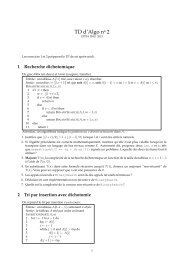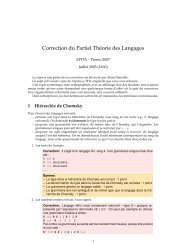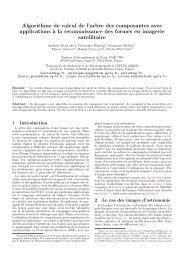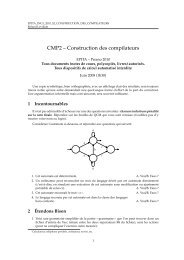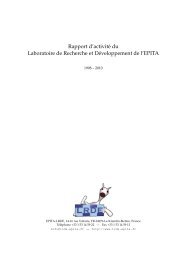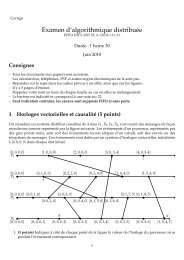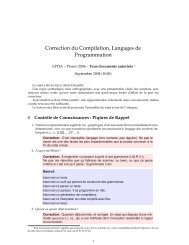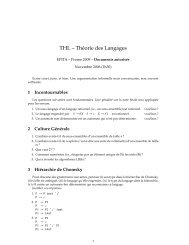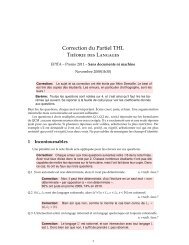Names, Scopes, and Bindings Names, Scopes, and ... - Lrde - Epita
Names, Scopes, and Bindings Names, Scopes, and ... - Lrde - Epita
Names, Scopes, and Bindings Names, Scopes, and ... - Lrde - Epita
You also want an ePaper? Increase the reach of your titles
YUMPU automatically turns print PDFs into web optimized ePapers that Google loves.
<strong>Bindings</strong><br />
Symbol Tables<br />
Complications<br />
<strong>Names</strong>, <strong>Scopes</strong>, <strong>and</strong> <strong>Bindings</strong><br />
<strong>Names</strong>, <strong>Scopes</strong>, <strong>and</strong> <strong>Bindings</strong><br />
Akim Demaille akim@lrde.epita.fr<br />
Rol<strong>and</strong> Levillain rol<strong>and</strong>@lrde.epita.fr<br />
EPITA — École Pour l’Informatique et les Techniques Avancées<br />
July 31, 2013<br />
1 <strong>Bindings</strong><br />
2 Symbol Tables<br />
3 Complications<br />
A. Demaille, R. Levillain <strong>Names</strong>, <strong>Scopes</strong>, <strong>and</strong> <strong>Bindings</strong> 2 / 55<br />
<strong>Bindings</strong><br />
<strong>Names</strong><br />
1 <strong>Bindings</strong><br />
<strong>Names</strong><br />
<strong>Scopes</strong><br />
Binding Time<br />
2 Symbol Tables<br />
3 Complications<br />
1 <strong>Bindings</strong><br />
<strong>Names</strong><br />
<strong>Scopes</strong><br />
Binding Time<br />
2 Symbol Tables<br />
3 Complications
<strong>Bindings</strong><br />
Symbol Tables<br />
Complications<br />
<strong>Names</strong><br />
<strong>Scopes</strong><br />
Binding Time<br />
<strong>Bindings</strong><br />
Symbol Tables<br />
Complications<br />
<strong>Names</strong><br />
<strong>Scopes</strong><br />
Binding Time<br />
<strong>Names</strong>, Identifiers, Symbols<br />
Identifiers<br />
Name (Identifiers, Symbols)<br />
reference<br />
address<br />
value<br />
To refer to some entities: variable, type, function, namespace,<br />
constant, control structure etc.<br />
usually alphanumeric <strong>and</strong> underscore, letter first, without<br />
white spaces.<br />
Algol 60, FORTRAN ignore white spaces.<br />
limitation on the length<br />
6 characters for the original FORTRAN (Fortran 90: 31),<br />
ISO C: 31<br />
no limit for most others.<br />
case insensitive in Modula-2 <strong>and</strong> Ada.<br />
A. Demaille, R. Levillain <strong>Names</strong>, <strong>Scopes</strong>, <strong>and</strong> <strong>Bindings</strong> 5 / 55<br />
A. Demaille, R. Levillain <strong>Names</strong>, <strong>Scopes</strong>, <strong>and</strong> <strong>Bindings</strong> 6 / 55<br />
<strong>Bindings</strong><br />
Symbol Tables<br />
Complications<br />
<strong>Names</strong><br />
<strong>Scopes</strong><br />
Binding Time<br />
<strong>Bindings</strong><br />
Symbol Tables<br />
Complications<br />
<strong>Names</strong><br />
<strong>Scopes</strong><br />
Binding Time<br />
<strong>Names</strong>, Objects, <strong>and</strong> <strong>Bindings</strong> [3]<br />
<strong>Names</strong>, Objects, <strong>and</strong> <strong>Bindings</strong><br />
Object 2<br />
Object 1 binding<br />
binding<br />
Name 1<br />
Name 2<br />
Name 3<br />
When are objects created <strong>and</strong> destroyed?<br />
Lifetimes (deferred to a later lecture).<br />
When are names created <strong>and</strong> destroyed?<br />
<strong>Scopes</strong>.<br />
Object 3<br />
binding<br />
binding<br />
Name 4<br />
When are bindings created <strong>and</strong> destroyed?<br />
Binding times.<br />
Object 4<br />
A. Demaille, R. Levillain <strong>Names</strong>, <strong>Scopes</strong>, <strong>and</strong> <strong>Bindings</strong> 7 / 55<br />
A. Demaille, R. Levillain <strong>Names</strong>, <strong>Scopes</strong>, <strong>and</strong> <strong>Bindings</strong> 8 / 55
<strong>Scopes</strong><br />
<strong>Bindings</strong><br />
Symbol Tables<br />
Complications<br />
<strong>Names</strong><br />
<strong>Scopes</strong><br />
Binding Time<br />
<strong>Scopes</strong> [3]<br />
1 <strong>Bindings</strong><br />
<strong>Names</strong><br />
<strong>Scopes</strong><br />
Binding Time<br />
2 Symbol Tables<br />
3 Complications<br />
When are names created, visible, <strong>and</strong> destroyed?<br />
Scope<br />
The textual region in the source in which the binding<br />
is active.<br />
Static Scoping<br />
The scope can be computed at compile-time.<br />
Dynamic Scoping<br />
The scope depends on runtime conditions such as the<br />
function calls.<br />
A. Demaille, R. Levillain <strong>Names</strong>, <strong>Scopes</strong>, <strong>and</strong> <strong>Bindings</strong> 10 / 55<br />
<strong>Bindings</strong><br />
Symbol Tables<br />
Complications<br />
<strong>Names</strong><br />
<strong>Scopes</strong><br />
Binding Time<br />
<strong>Bindings</strong><br />
Symbol Tables<br />
Complications<br />
<strong>Names</strong><br />
<strong>Scopes</strong><br />
Binding Time<br />
Why <strong>Scopes</strong>?<br />
Declaration<br />
<strong>Scopes</strong> are the first form of structure/modularity<br />
No scopes in assembly<br />
No scopes in MFS<br />
(First generation of the Macintosh File System)<br />
Without scopes, names have a global influence<br />
With scopes, the programmer can focus on local influences<br />
<strong>Scopes</strong> in correct programs with unique identifiers are<br />
“useless”<br />
C++ namespaces are “pure scopes”<br />
Blocks determine scopes.<br />
local variables<br />
non local variables<br />
global variables<br />
int global;<br />
int outer (void)<br />
{<br />
int local, non_local;<br />
int inner (void)<br />
{<br />
return global + non_local;<br />
}<br />
return inner ();<br />
}<br />
A. Demaille, R. Levillain <strong>Names</strong>, <strong>Scopes</strong>, <strong>and</strong> <strong>Bindings</strong> 11 / 55<br />
A. Demaille, R. Levillain <strong>Names</strong>, <strong>Scopes</strong>, <strong>and</strong> <strong>Bindings</strong> 12 / 55
<strong>Bindings</strong><br />
Symbol Tables<br />
Complications<br />
<strong>Names</strong><br />
<strong>Scopes</strong><br />
Binding Time<br />
<strong>Bindings</strong><br />
Symbol Tables<br />
Complications<br />
<strong>Names</strong><br />
<strong>Scopes</strong><br />
Binding Time<br />
Static Scoping<br />
Dynamic Scoping<br />
In most languages<br />
(Ada, C, Tiger, FORTRAN, Scheme, Perl (my), etc.).<br />
Enables static binding.<br />
Enables static typing.<br />
Enables strong typing (Ada, Algol 68, Tiger).<br />
safer<br />
faster<br />
clearer<br />
In most scripting/interpreted languages (Perl (local), Shell<br />
Script, TEX etc.) but also in Lisp (as opposed to Scheme).<br />
Dynamic Scoping in TeX<br />
% \x, \y undefined.<br />
{<br />
% \x, \y undefined.<br />
\def \x 1<br />
% \x defined, \y undefined.<br />
\ifnum \a < 42<br />
\def \y 51<br />
\fi<br />
% \x defined, \y may be defined.<br />
}<br />
% \x, \y undefined.<br />
Prevents static typing: an identifier may refer to different<br />
values, with different types.<br />
A. Demaille, R. Levillain <strong>Names</strong>, <strong>Scopes</strong>, <strong>and</strong> <strong>Bindings</strong> 13 / 55<br />
A. Demaille, R. Levillain <strong>Names</strong>, <strong>Scopes</strong>, <strong>and</strong> <strong>Bindings</strong> 14 / 55<br />
<strong>Bindings</strong><br />
Symbol Tables<br />
Complications<br />
<strong>Names</strong><br />
<strong>Scopes</strong><br />
Binding Time<br />
<strong>Bindings</strong><br />
Symbol Tables<br />
Complications<br />
<strong>Names</strong><br />
<strong>Scopes</strong><br />
Binding Time<br />
<strong>Scopes</strong><br />
<strong>Scopes</strong> [1]<br />
Many different t, including several “variables”.<br />
t time<br />
let<br />
type t = { h: int, t: t }<br />
function t (h: int, t: t) : t =<br />
t { h = h, t = t }<br />
var t := t (12, nil)<br />
var t := t (12, t)<br />
in<br />
t.t = t<br />
end<br />
ML<br />
structure M = struct<br />
structure E = struct<br />
val a = 5;<br />
end<br />
structure N = struct<br />
val b = 10;<br />
val a = E.a + b;<br />
end<br />
structure D = struct<br />
val d = E.a + N.a;<br />
end<br />
end<br />
Java (fwd declaration allowed)<br />
package M;<br />
class E {<br />
static int a = 5;<br />
}<br />
class N {<br />
static int b = 10;<br />
static int a = E.a + b;<br />
}<br />
class D {<br />
static int d = E.a + N.a;<br />
}<br />
A. Demaille, R. Levillain <strong>Names</strong>, <strong>Scopes</strong>, <strong>and</strong> <strong>Bindings</strong> 15 / 55<br />
A. Demaille, R. Levillain <strong>Names</strong>, <strong>Scopes</strong>, <strong>and</strong> <strong>Bindings</strong> 16 / 55
<strong>Bindings</strong><br />
Symbol Tables<br />
Complications<br />
<strong>Names</strong><br />
<strong>Scopes</strong><br />
Binding Time<br />
<strong>Bindings</strong><br />
Symbol Tables<br />
Complications<br />
<strong>Names</strong><br />
<strong>Scopes</strong><br />
Binding Time<br />
<strong>Scopes</strong> [1]<br />
Extent<br />
structure M = struct<br />
structure E = struct<br />
val a = 5;<br />
end<br />
structure N = struct<br />
val b = 10;<br />
val a = E.a + b;<br />
end<br />
structure D = struct<br />
val d = E.a + N.a;<br />
end<br />
end<br />
σ 0 = Prelude<br />
σ 1 = {a : int}<br />
σ 2 = {E : σ 1 }<br />
σ 3 = {b : int, a : int}<br />
σ 4 = {N : σ 3 }<br />
σ 5 = {d : int}<br />
σ 6 = {D : σ 5 }<br />
σ 7 = σ 2 + σ 4 + σ 6<br />
σ 0 + σ 2 ⊢ N : σ 3 (ML)<br />
σ 0 + σ 2 + σ 4 ⊢ N : σ 3 (Java)<br />
Lifetime is a different matter, related to the execution (as<br />
opposed to visibility).<br />
Extent bound to lifetime of block tend to promote global<br />
variables (Pascal).<br />
Static local variables as in C (static), Algol 60 own, PL/I.<br />
Initialization?<br />
Modules tend to replace this block related feature.<br />
σ 0 + σ 2 + σ 4 + σ 6 ⊢ M : σ 7<br />
A. Demaille, R. Levillain <strong>Names</strong>, <strong>Scopes</strong>, <strong>and</strong> <strong>Bindings</strong> 17 / 55<br />
A. Demaille, R. Levillain <strong>Names</strong>, <strong>Scopes</strong>, <strong>and</strong> <strong>Bindings</strong> 18 / 55<br />
Binding Time<br />
<strong>Bindings</strong><br />
Symbol Tables<br />
Complications<br />
<strong>Names</strong><br />
<strong>Scopes</strong><br />
Binding Time<br />
Binding Time [3]<br />
1 <strong>Bindings</strong><br />
<strong>Names</strong><br />
<strong>Scopes</strong><br />
Binding Time<br />
2 Symbol Tables<br />
3 Complications<br />
When a binding from a name to an object is made.<br />
Binding Time<br />
Examples<br />
language design if<br />
language implementation data width<br />
program writing foo, bar<br />
compilation<br />
static objects, code<br />
linkage<br />
relative addresses<br />
loading<br />
shared objects<br />
execution<br />
heap objects<br />
A. Demaille, R. Levillain <strong>Names</strong>, <strong>Scopes</strong>, <strong>and</strong> <strong>Bindings</strong> 20 / 55
<strong>Bindings</strong><br />
Symbol Tables<br />
Complications<br />
Binding Time: the moving IN<br />
<strong>Names</strong><br />
<strong>Scopes</strong><br />
Binding Time<br />
<strong>Bindings</strong><br />
Symbol Tables<br />
Complications<br />
<strong>Names</strong><br />
<strong>Scopes</strong><br />
Binding Time<br />
Dynamic Binding: virtual in C++<br />
Roughly, flexibility <strong>and</strong> efficiency<br />
are mutually exclusive<br />
depend on binding time.<br />
The Moving In<br />
binding-time<br />
early ---------------------------------> late<br />
INflexibility<br />
efficiency<br />
flexibility<br />
INefficiency<br />
Dynamic dispatch is roughly runtime overloading.<br />
Dynamic Dispatch in C++<br />
struct Shape<br />
{<br />
virtual void draw () const = 0;<br />
};<br />
struct Square : public Shape<br />
{<br />
virtual void draw () const {};<br />
};<br />
struct Circle : public Shape<br />
{<br />
virtual void draw () const {};<br />
};<br />
A. Demaille, R. Levillain <strong>Names</strong>, <strong>Scopes</strong>, <strong>and</strong> <strong>Bindings</strong> 21 / 55<br />
A. Demaille, R. Levillain <strong>Names</strong>, <strong>Scopes</strong>, <strong>and</strong> <strong>Bindings</strong> 22 / 55<br />
<strong>Bindings</strong><br />
Symbol Tables<br />
Complications<br />
<strong>Names</strong><br />
<strong>Scopes</strong><br />
Binding Time<br />
Dynamic Binding: virtual in C++<br />
<strong>Bindings</strong><br />
Symbol Tables<br />
Complications<br />
Late Code Binding: eval<br />
<strong>Names</strong><br />
<strong>Scopes</strong><br />
Binding Time<br />
Dynamic Dispatch in C++<br />
#include <br />
#include "shapes.hh"<br />
typedef std::list shapes_type;<br />
int main ()<br />
{<br />
shapes_type ss;<br />
ss.push_back (new Circle);<br />
ss.push_back (new Square);<br />
}<br />
for (shapes_type::iterator i = ss.begin ();<br />
i != ss.end (); ++i)<br />
// Inclusion polymorphism.<br />
(*i)->draw ();<br />
Most interpreted<br />
languages support<br />
eval (explicit or<br />
not): runtime code<br />
evaluation.<br />
Enables language<br />
extensions.<br />
try/catch in Perl<br />
sub try (&@) {<br />
my ($try, $catch) = @_;<br />
eval { &$try }; # Explicit eval.<br />
if ($@) {<br />
local $_ = $@;<br />
&$catch;<br />
}<br />
}<br />
sub catch (&) {<br />
$_[0];<br />
# implicit eval.<br />
}<br />
try {<br />
die "phooey";<br />
} catch {<br />
/phooey/ <strong>and</strong> print "unphooey\n";<br />
};<br />
A. Demaille, R. Levillain <strong>Names</strong>, <strong>Scopes</strong>, <strong>and</strong> <strong>Bindings</strong> 23 / 55<br />
A. Demaille, R. Levillain <strong>Names</strong>, <strong>Scopes</strong>, <strong>and</strong> <strong>Bindings</strong> 24 / 55
<strong>Bindings</strong><br />
Symbol Tables<br />
Complications<br />
Binding Times in Tiger [3]<br />
<strong>Names</strong><br />
<strong>Scopes</strong><br />
Binding Time<br />
Symbol Tables<br />
1 <strong>Bindings</strong><br />
Design Keywords<br />
Program Identifiers<br />
Compile Function code, frames, types<br />
Execution Records, arrays addresses<br />
Little dynamic behavior<br />
2 Symbol Tables<br />
3 Complications<br />
A. Demaille, R. Levillain <strong>Names</strong>, <strong>Scopes</strong>, <strong>and</strong> <strong>Bindings</strong> 25 / 55<br />
<strong>Bindings</strong><br />
Symbol Tables<br />
Complications<br />
<strong>Bindings</strong><br />
Symbol Tables<br />
Complications<br />
Visiting an ast<br />
Symbol Tables: <strong>Scopes</strong><br />
For statically scoped languages<br />
many traversals check uses against definitions<br />
most traversals need a form of memory (binding, type,<br />
escapes, inlining, translation, etc.)<br />
this memory is related to scopes<br />
we need some reversible memory (do/undo)<br />
Similarly for narrow compilers without ast<br />
H<strong>and</strong>le scopes?<br />
not needed if all the names<br />
are unique<br />
or if there exists a unique<br />
identifier<br />
required otherwise<br />
H<strong>and</strong>le scopes explicitly?<br />
yes: the tables support<br />
undo: scoped symbol tables<br />
no: rely on automatic<br />
variables<br />
A. Demaille, R. Levillain <strong>Names</strong>, <strong>Scopes</strong>, <strong>and</strong> <strong>Bindings</strong> 27 / 55<br />
A. Demaille, R. Levillain <strong>Names</strong>, <strong>Scopes</strong>, <strong>and</strong> <strong>Bindings</strong> 28 / 55
<strong>Bindings</strong><br />
Symbol Tables<br />
Complications<br />
(Non Scoped) Symbol Tables<br />
<strong>Bindings</strong><br />
Symbol Tables<br />
Complications<br />
Scoped Symbol Table: symbol::Table<br />
An associative array<br />
put<br />
get<br />
Implementation<br />
a list<br />
a tree<br />
a hash<br />
...<br />
class Table<br />
template< class Entry_T ><br />
class Table<br />
{<br />
public:<br />
Table ();<br />
void put (Symbol key, Entry_T& val);<br />
Entry_T* get (Symbol key) const;<br />
void scope_begin ();<br />
void scope_end ();<br />
void print (std::ostream& ostr) const;<br />
};<br />
Not very C++...<br />
A. Demaille, R. Levillain <strong>Names</strong>, <strong>Scopes</strong>, <strong>and</strong> <strong>Bindings</strong> 29 / 55<br />
<strong>Bindings</strong><br />
Symbol Tables<br />
Complications<br />
Scoped Symbol Table Implementations<br />
A. Demaille, R. Levillain <strong>Names</strong>, <strong>Scopes</strong>, <strong>and</strong> <strong>Bindings</strong> 30 / 55<br />
Memory Management<br />
<strong>Bindings</strong><br />
Symbol Tables<br />
Complications<br />
Mixing Stacks <strong>and</strong> Associative Arrays<br />
Copying, or not copying?<br />
Functional (Non Destructive) Versions<br />
Mongrels<br />
When do you deallocate associated data?<br />
scope end deallocate everything since the latest scope begin<br />
pass end deallocate auxiliary data after the traversal is<br />
completed<br />
ast bind the data to the ast <strong>and</strong> delegate deallocation<br />
by h<strong>and</strong> thanks God for Valgrind <strong>and</strong> Paracetamol<br />
never tu sors<br />
A. Demaille, R. Levillain <strong>Names</strong>, <strong>Scopes</strong>, <strong>and</strong> <strong>Bindings</strong> 31 / 55<br />
A. Demaille, R. Levillain <strong>Names</strong>, <strong>Scopes</strong>, <strong>and</strong> <strong>Bindings</strong> 32 / 55
<strong>Bindings</strong><br />
Symbol Tables<br />
Complications<br />
Memory Management: Deallocate on scope exit<br />
<strong>Bindings</strong><br />
Symbol Tables<br />
Complications<br />
Memory Management: Deallocate with the AST<br />
But then...<br />
Twice foo<br />
let var foo := 42<br />
var foo := 51<br />
in foo end<br />
but then again...<br />
Escaping type<br />
let type rec = {}<br />
in rec {} end nil<br />
Two lets<br />
let var foo := 42 in<br />
let var foo := 51<br />
in foo end end<br />
Segmentation violation...<br />
Courtesy of Arnaud Fabre.<br />
annotate each node of ast<br />
annotate each scoping node with a symbol table <strong>and</strong> link them<br />
leave tables outside<br />
A. Demaille, R. Levillain <strong>Names</strong>, <strong>Scopes</strong>, <strong>and</strong> <strong>Bindings</strong> 33 / 55<br />
A. Demaille, R. Levillain <strong>Names</strong>, <strong>Scopes</strong>, <strong>and</strong> <strong>Bindings</strong> 34 / 55<br />
<strong>Bindings</strong><br />
Symbol Tables<br />
Complications<br />
Factoring Scope H<strong>and</strong>ling<br />
Binder<br />
<strong>Bindings</strong><br />
Symbol Tables<br />
Complications<br />
no scope h<strong>and</strong>ling needed if names are unique<br />
so use regular associative containers<br />
but how can you guarantee unique names<br />
do you need to make names uniques?<br />
Bind the names/Label by definition address<br />
annotates uses with links to their definitions<br />
uses scoped symbol tables<br />
or regular containers <strong>and</strong> recursion<br />
checks multiple definitions<br />
checks missing definitions<br />
<strong>and</strong> also binds... breaks to their loops<br />
A. Demaille, R. Levillain <strong>Names</strong>, <strong>Scopes</strong>, <strong>and</strong> <strong>Bindings</strong> 35 / 55<br />
A. Demaille, R. Levillain <strong>Names</strong>, <strong>Scopes</strong>, <strong>and</strong> <strong>Bindings</strong> 36 / 55
Complications<br />
Overloading<br />
1 <strong>Bindings</strong><br />
1 <strong>Bindings</strong><br />
2 Symbol Tables<br />
2 Symbol Tables<br />
3 Complications<br />
Overloading<br />
Non Local Variables<br />
3 Complications<br />
Overloading<br />
Non Local Variables<br />
<strong>Bindings</strong><br />
Symbol Tables<br />
Complications<br />
Overloading<br />
Non Local Variables<br />
<strong>Bindings</strong><br />
Symbol Tables<br />
Complications<br />
Overloading<br />
Non Local Variables<br />
Overloading<br />
Operator Overloading<br />
Overloading: Homonyms<br />
Several entities bearing the<br />
same name, but statically<br />
distinguishable, e.g., by their<br />
arity, type etc.<br />
Aliasing: Synonyms<br />
One entity bearing several<br />
names.<br />
// foo is overloaded.<br />
int foo (int);<br />
int foo (float);<br />
// x <strong>and</strong> y are aliases.<br />
int x;<br />
int& y = x;<br />
Overloading is meant to simplify the user’s life. Since FORTRAN!<br />
Overloading in Caml<br />
# 1 + 2;;<br />
- : int = 3<br />
# 1.0 + 2.0;;<br />
Characters 0-3:<br />
1.0 + 2.0;;<br />
^^^<br />
This expression has type float but is here used with type int<br />
# 1.0 +. 2.0;;<br />
- : float = 3.<br />
Thank God, C was invented to improve Caml:<br />
int a = 1 + 2;;<br />
float b = 1.0 + 2.0;;<br />
Of course this is unfair: Caml has type inference.<br />
A. Demaille, R. Levillain <strong>Names</strong>, <strong>Scopes</strong>, <strong>and</strong> <strong>Bindings</strong> 39 / 55<br />
A. Demaille, R. Levillain <strong>Names</strong>, <strong>Scopes</strong>, <strong>and</strong> <strong>Bindings</strong> 40 / 55
Function Overloading<br />
<strong>Bindings</strong><br />
Symbol Tables<br />
Complications<br />
Overloading<br />
Non Local Variables<br />
<strong>Bindings</strong><br />
Symbol Tables<br />
Complications<br />
Overloading is Syntactic Sugar<br />
Overloading<br />
Non Local Variables<br />
Usually based on the arguments<br />
(Ada, C++, Java...; not C, Algol 60, Fortran...).<br />
Algol 60<br />
integer I;<br />
real X;<br />
...<br />
PUTSTRING("results are: "); PUTINT(I); PUTREAL(X);<br />
Ada [2]<br />
I : INTEGER;<br />
X : REAL;<br />
...<br />
PUT("results are: "); PUT(I); PUT(X);<br />
Overloaded<br />
#include <br />
void foo (int);<br />
void foo (char);<br />
void foo (const char*);<br />
void foo (std::string);<br />
int<br />
main ()<br />
{<br />
foo (0);<br />
foo (’0’);<br />
foo ("0");<br />
foo (std::string ("0"));<br />
}<br />
Un-overloaded<br />
#include <br />
void foo_int (int);<br />
void foo_char (char);<br />
void foo_char_p (const char*);<br />
void foo_std_string (std::string);<br />
int<br />
main ()<br />
{<br />
foo_int (0);<br />
foo_char (’0’);<br />
foo_char_p ("0");<br />
foo_std_string (std::string ("0"));<br />
}<br />
A. Demaille, R. Levillain <strong>Names</strong>, <strong>Scopes</strong>, <strong>and</strong> <strong>Bindings</strong> 41 / 55<br />
A. Demaille, R. Levillain <strong>Names</strong>, <strong>Scopes</strong>, <strong>and</strong> <strong>Bindings</strong> 42 / 55<br />
<strong>Bindings</strong><br />
Symbol Tables<br />
Complications<br />
Overloading is Syntactic Sugar<br />
Overloading<br />
Non Local Variables<br />
Overloading in Tiger<br />
<strong>Bindings</strong><br />
Symbol Tables<br />
Complications<br />
Overloading<br />
Non Local Variables<br />
Usually solved by renaming/mangling.<br />
g++-2.95, como<br />
g++-3.2, icc<br />
f__Fi -> int f(int);<br />
f__FPc -> int f(char*);<br />
_Z1fi -> int f(int);<br />
_Z1fPc -> int f(char*);<br />
Ordering = are overloaded for pairs of integers,<br />
or strings.<br />
Identity = <strong>and</strong> are overloaded for (type coherent) pairs of<br />
integers, strings, arrays or records.<br />
A. Demaille, R. Levillain <strong>Names</strong>, <strong>Scopes</strong>, <strong>and</strong> <strong>Bindings</strong> 43 / 55<br />
A. Demaille, R. Levillain <strong>Names</strong>, <strong>Scopes</strong>, <strong>and</strong> <strong>Bindings</strong> 44 / 55
Non Local Variables<br />
<strong>Bindings</strong><br />
Symbol Tables<br />
Complications<br />
Overloading<br />
Non Local Variables<br />
Lambda Shifting<br />
1 <strong>Bindings</strong><br />
2 Symbol Tables<br />
3 Complications<br />
Overloading<br />
Non Local Variables<br />
With nested functions<br />
int global;<br />
int outer (void)<br />
{<br />
int local, non_local;<br />
int inner (void)<br />
{<br />
return<br />
global + non_local;<br />
}<br />
return inner ();<br />
}<br />
Without<br />
int global;<br />
int outer_inner_ (int* non_local)<br />
{<br />
return global + *non_local;<br />
}<br />
int outer (void)<br />
{<br />
int local, non_local;<br />
return outer_inner_ (&non_local);<br />
}<br />
A. Demaille, R. Levillain <strong>Names</strong>, <strong>Scopes</strong>, <strong>and</strong> <strong>Bindings</strong> 46 / 55<br />
<strong>Bindings</strong><br />
Symbol Tables<br />
Complications<br />
Overloading<br />
Non Local Variables<br />
<strong>Bindings</strong><br />
Symbol Tables<br />
Complications<br />
Overloading<br />
Non Local Variables<br />
Non Local Variables<br />
Non Non Local Variables<br />
let<br />
function outer (): int =<br />
let<br />
non-local var outer := 0<br />
in<br />
let<br />
function inner () : int =<br />
let<br />
var inner := 1<br />
in<br />
inner + outer<br />
end<br />
in<br />
inner ()<br />
end<br />
end<br />
in<br />
outer ()<br />
end<br />
let<br />
in<br />
end<br />
let<br />
local var outer := 0<br />
in<br />
let<br />
in<br />
end<br />
end<br />
let<br />
var inner := 1<br />
in<br />
inner + outer<br />
end<br />
A. Demaille, R. Levillain <strong>Names</strong>, <strong>Scopes</strong>, <strong>and</strong> <strong>Bindings</strong> 47 / 55<br />
A. Demaille, R. Levillain <strong>Names</strong>, <strong>Scopes</strong>, <strong>and</strong> <strong>Bindings</strong> 48 / 55
<strong>Bindings</strong><br />
Symbol Tables<br />
Complications<br />
Non Non Local Variables<br />
Overloading<br />
Non Local Variables<br />
<strong>Bindings</strong><br />
Symbol Tables<br />
Complications<br />
Overloading<br />
Non Local Variables<br />
The Escapes <strong>and</strong> Functional Programming<br />
let<br />
function outer (): int =<br />
let<br />
local var outer := 0<br />
in<br />
let<br />
in<br />
end<br />
end<br />
in<br />
outer ()<br />
end<br />
let<br />
var inner := 1<br />
in<br />
inner + outer<br />
end<br />
let<br />
function add (non-local a: int, b: int) : int =<br />
let<br />
function add_a (x: int) : int = a + x<br />
in<br />
add_a (b)<br />
end<br />
in<br />
print_int (add (1, 2));<br />
print ("\n")<br />
end<br />
A. Demaille, R. Levillain <strong>Names</strong>, <strong>Scopes</strong>, <strong>and</strong> <strong>Bindings</strong> 49 / 55<br />
A. Demaille, R. Levillain <strong>Names</strong>, <strong>Scopes</strong>, <strong>and</strong> <strong>Bindings</strong> 50 / 55<br />
<strong>Bindings</strong><br />
Symbol Tables<br />
Complications<br />
Overloading<br />
Non Local Variables<br />
<strong>Bindings</strong><br />
Symbol Tables<br />
Complications<br />
Overloading<br />
Non Local Variables<br />
Closures<br />
The Escapes & Recursion<br />
let<br />
function add_gen (non-local a: int) : int -> int =<br />
let<br />
function add_a (x: int) : int = a + x<br />
in<br />
add_a<br />
end<br />
incr = add_gen (1);<br />
in<br />
print_int (incr (2));<br />
print ("\n");<br />
end<br />
let<br />
function one (input : int) =<br />
let<br />
function two () =<br />
(print ("two: "); print_int (input);<br />
print ("\n");<br />
one (input))<br />
in<br />
if input > 0 then<br />
(input := input - 1;<br />
two (); print ("one: ");<br />
print_int (input); print ("\n"))<br />
end<br />
in<br />
one (3)<br />
end<br />
A. Demaille, R. Levillain <strong>Names</strong>, <strong>Scopes</strong>, <strong>and</strong> <strong>Bindings</strong> 51 / 55<br />
A. Demaille, R. Levillain <strong>Names</strong>, <strong>Scopes</strong>, <strong>and</strong> <strong>Bindings</strong> 52 / 55
<strong>Bindings</strong><br />
Symbol Tables<br />
Complications<br />
Overloading<br />
Non Local Variables<br />
<strong>Bindings</strong><br />
Symbol Tables<br />
Complications<br />
Overloading<br />
Non Local Variables<br />
Escaping Variables/Arguments<br />
Annotating the ast<br />
Technically escaping means “cannot be stored in a register”.<br />
In C:<br />
Large values (arrays,<br />
structs).<br />
Variables which address is<br />
taken.<br />
Variable arguments.<br />
In Tiger:<br />
variables/arguments from<br />
outer functions<br />
not variables/arguments<br />
from outer scopes.<br />
being non local means having non local uses<br />
obviously non local variables need to be accessible from inner<br />
functions<br />
to simplify the compiler, it is easier to leave them on the stack<br />
hence the translation to intermediate representation needs to<br />
know which variables are non local from their definitions<br />
therefore a preleminary pass should flag non local variables<br />
A. Demaille, R. Levillain <strong>Names</strong>, <strong>Scopes</strong>, <strong>and</strong> <strong>Bindings</strong> 53 / 55<br />
A. Demaille, R. Levillain <strong>Names</strong>, <strong>Scopes</strong>, <strong>and</strong> <strong>Bindings</strong> 54 / 55<br />
<strong>Bindings</strong><br />
Symbol Tables<br />
Complications<br />
Overloading<br />
Non Local Variables<br />
Bibliography I<br />
Andrew W. Appel.<br />
Modern Compiler Implementation in C, Java, ML.<br />
Cambridge University Press, 1998.<br />
Ada Reference Manual, 1983.<br />
Stephen Edwards.<br />
COMS W4115 Programming Languages <strong>and</strong> Translators,<br />
2003.<br />
http://www.cs.columbia.edu/~sedwards/classes/2003/<br />
w4115/.<br />
A. Demaille, R. Levillain <strong>Names</strong>, <strong>Scopes</strong>, <strong>and</strong> <strong>Bindings</strong> 55 / 55



